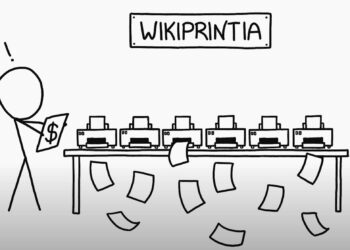Social media have given birth to a whole new species of consultant, the Social Media Guru. If you’ve spent much time online lately, or been to a publishing meeting in the last few years, you’ve no doubt heard all the buzzwords and catchphrases, and are probably still perplexed about what it all means and how to turn it into a practical real-world product. The phenomenon is nicely summed up in this video (warning, this video contains lots of language some might find offensive, others might find hilarious):
Speaking of Social Media Gurus, it’s time for a follow-up on Chris Anderson. As you may recall, Anderson recently wrote a book titled “Free”, and in it, he espoused the “freemium” business model, where one gives away content for free as a means of generating sales. Give Anderson credit–unlike most Social Media Gurus, he is actually trying to put a theory into practice rather than just spouting buzzwords. “Free” was available for free via download for a limited time as a Kindle book, on Scribd, and it appears it’s still available on Google Books and as a free audiobook through iTunes. The results from this experiment?
“Free” was given away to 500,000 people via various e-book platforms, but sold less than what Chris’s previous book had (”The Long Tail“).
Looks like a business model that needs some further refining.
Discussion
11 Thoughts on "The Social Media Guru"
With all due respect to those who are in the business of self promotion, I am extremely suspicious of anyone who calls themself a “guru” on the subject of social media. The landscape is changing so quickly, vocabulary can’t even come up, which leads to jargon, which leads to the false impression that somehow certain people are “experts” just because most of us don’t understand what they are saying.
The problem with Chris Anderson’s “free” model for “Free” is that he is giving away the same thing as he was asking people to pay for. OK, yes, one version was in print but it is the same content.
I remember reading his (open access) Wired article on the Long Tail and then deciding to buy the book. It turned out to be a bad decision as there is nothing of consequence added to the book and the article is a more succinct read, but as a marketing tool the free article did indeed lead me to buy the book.
But I’m not sure how the free book would inspire me to buy the same book for free.
Also, and on a separate note, I suppose this is not a good moment to announce my new social media consulting services?
But there are authors (Cory Doctorow as one example) who give away the full content of their books only to see increases in sales. I’d argue there were two flaws in the application of the freemium model here:
1) the nature of the content–one argument for the freemium model is that reading on a screen does not lend itself well to long-form reading. You give away a free version that’s read on a computer screen, people start reading it, and if they like it after 50 pages, they go buy the print version to read the whole thing. I haven’t read “Free”, but every Web 2.0 or business model book that I have read peters out after about 50 pages. By that point, you understand the argument being made and the rest of the book is just a bunch of anecdotes reinforcing the argument. There’s no need to read further, you can get enough from the beginnings of the free version. Contrast this with a fiction novel, like Doctorow writes. For a novel, you need to read the whole thing to get the full effect of the content.
2) the freemium model is great for selling your next book, not your current book–Baen Books has pioneered the idea of a free library. You can download free copies of an author’s older books. If they’re good, they’ll hopefully inspire you to buy the author’s new book, which is not free. This works great for books that are part of a series. Make book 1 in the series free as book 2 is released. Here, as you note, Anderson gave away the actual book he was trying to sell. Perhaps a better strategy would have been giving away his previous book to promote the new one.
I think Chris’s problems with his new book were
1) The rather unfortunate accidental extraction of chunks of wikipedia… and
2) The fact that anyone listening to the audio version in the car, whilst, say, on the way to work, would realise that the book was in fact a load of old rubbish (IMHO).
I liked the long tail, because there is something in the argument – His point about the need for filters to enable the long tail to really work, still stands I think (tho’ he didn’t explore anywhere that rather crucial point). Free was an entertaining 30 minute talk (I know – I saw it) stretched beyond credulity in world that had just discovered that debt wasn’t so cheap as to be free.
by the way… err, does social media guruness correlate with, um, facial hair? Guys?… 😉
Facial hair is a very important qualification in publishing and media consulting of all kinds, though it is a positively essential indicator of social media guruness. The reasons for this are complicated and still being researched. Study results are expected to be published next year in the Journal of Theoretical Research (JTR).
Completely agree regarding the differences between fiction and business books. Business books are also typically not that long in the first place and yes, the first 50 pages is usually all one needs.
The only danger with giving away older books is if the new book becomes a bigger hit than the old one. In that instances, readers of the new book (who never read the old one) may go back and buy the old one. So the new book can become marketing for the author’s backlist. Of course, that falls into the category of “nice problems to have.”
This video is very funny! Great commentary.
Re the dubious value of social media consultants, here’s a dissenting voice (thanks to John Sack):
http://marshallk.com/social-media-consulting-can-be-extremely-valuable


